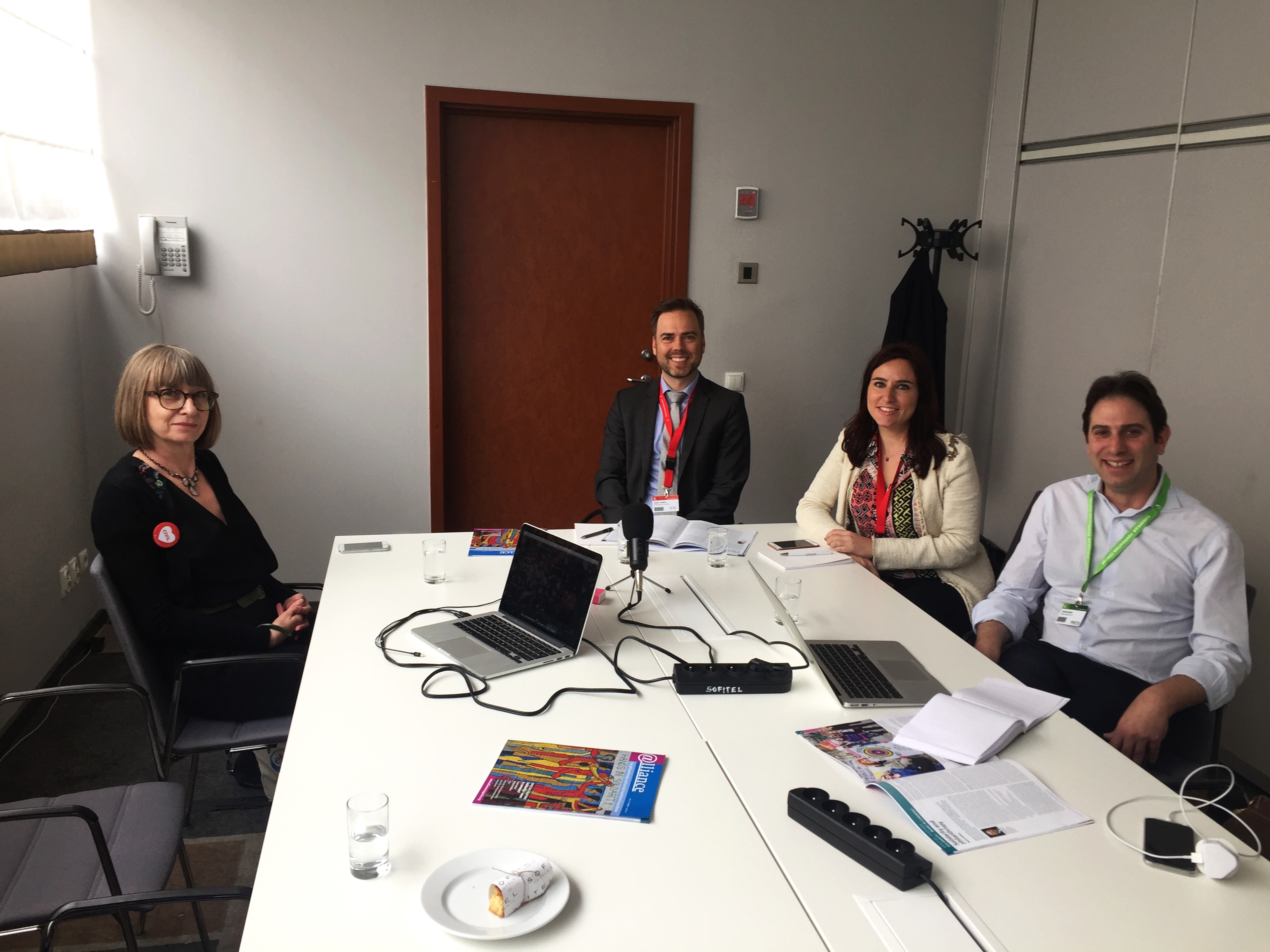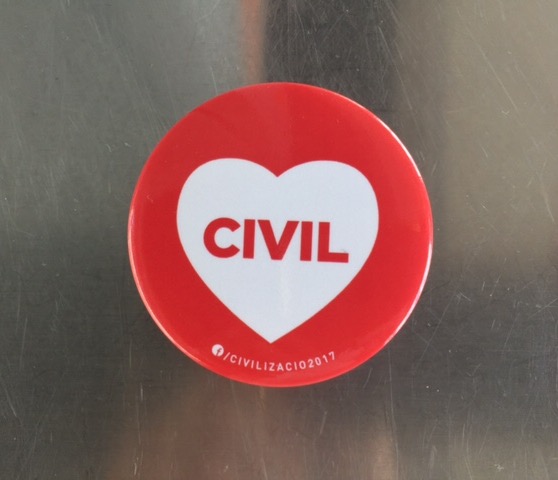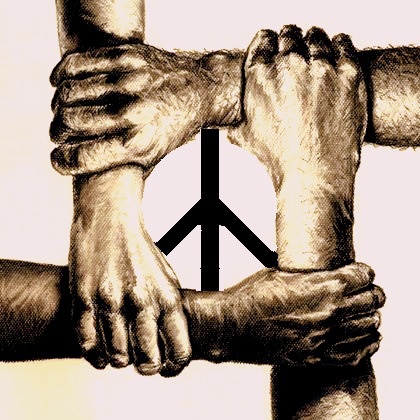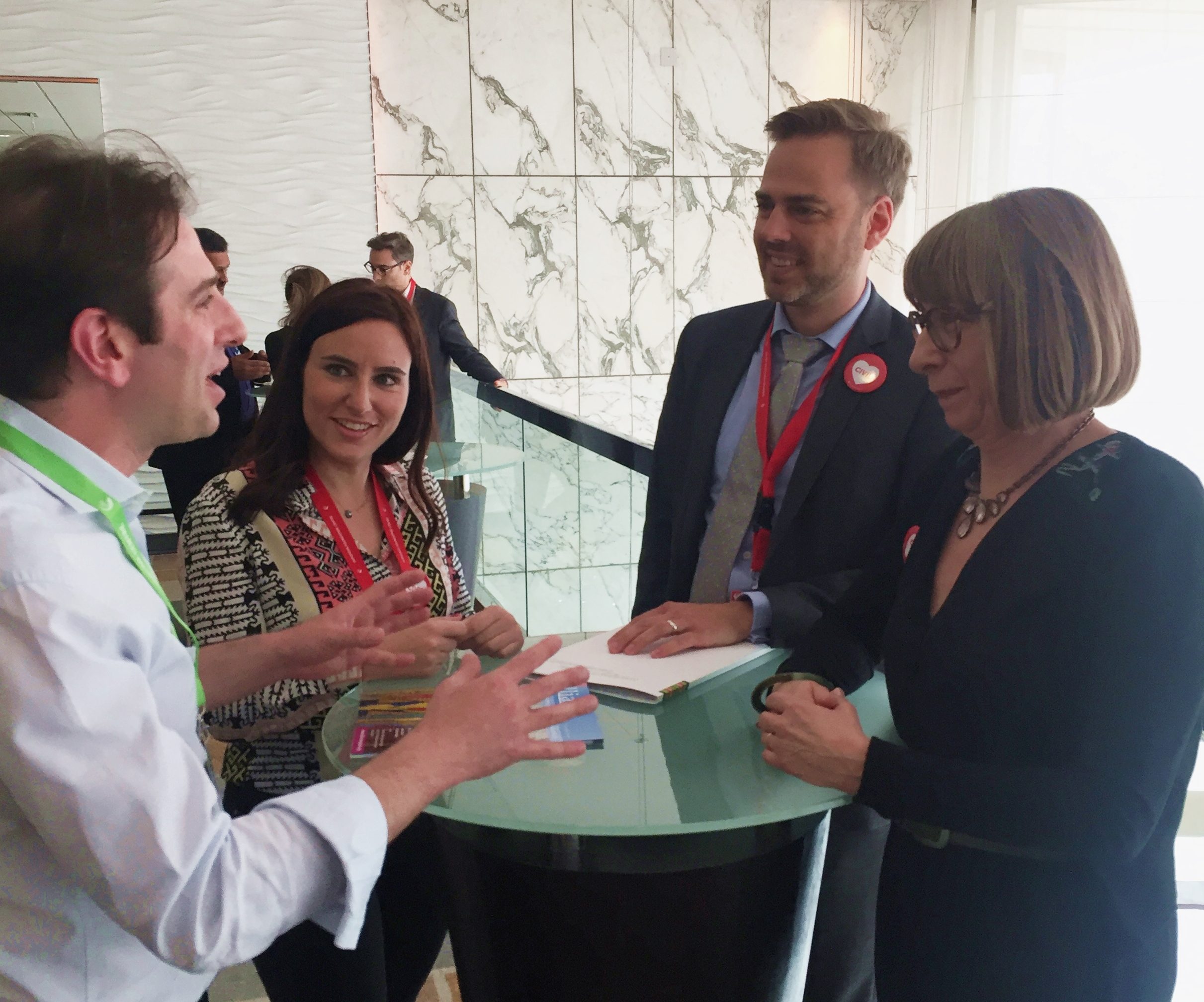Welcome to the second Alliance Audio – recorded live from Warsaw at the 2017 European Foundation Centre conference!
This is the latest in a new series debating key issues in philanthropy with guests from across the foundation world.
In this podcast Alliance editor Charles Keidan hosts a discussion with Ewa Kulik-Bielińska, outgoing Chair of the EFC and Director of the Stefan Batory Foundation, Stefan Schäfers, Head of European Affairs at the King Baudouin Foundation and Liana Varon, Deputy Secretary General at the Third Sector Foundation of Turkey.
Following on from their pieces in Alliance over the last few months, these philanthropy experts and practitioners discuss the controversial topic of solidarity within philanthropy; What does solidarity look like from where they are? And how is philanthropy responding to the strains between people and states across Europe. If solidarity means different things to different people, how can philanthropy help to build a shared humanity?
Transcript:
Charles: Welcome to alliancemagazine.org. I’m Charles Keidan, editor of Alliance, the magazine which specializes in philanthropy.
This is the second podcast in our new series of Alliance Audio, recorded live here from the European Foundation Centre’s annual general assembly in Warsaw, Poland. In this podcast, we’re exploring the complex relationship between philanthropy and solidarity.
We’re asking how philanthropy can manage the strains between people and states across Europe. If solidarity means different things to different people, how can philanthropy help to build a shared humanity? To discuss the topic, I’m delighted to be joined by three philanthropy practitioners who have written about solidarity in the pages of Alliance. We have Ewa Kulik-Bielińska, first up, the director of the Stefan Battery foundation in Poland. Hello, Ewa.
Ewa: Hello, Charles.
Charles: And we’re also joined by Stefan Shäfers, Head of European Affairs at Belgium’s King Baudouin Foundation. Hello, Stefan.
Stefan: Hello, Charles.
Charles: And last but by no means least, we have Liana Varon, Deputy Secretary General of Tüsev, the association of Turkish foundations. Hello, Liana.
Liana: Hello, Charles.
Charles: Thank you. Great to have you all here and thank you for taking some time out during the conference events. Eva, if we could just start with you. You’re chairing, as chair of the European Foundation Centre, this remarkable gathering of many tens, maybe hundreds of European foundations here in Warsaw. How’s it going so far?
Ewa: I’m quite surprised by the numbers. When we were planning the conference in Warsaw, and the planning time is usually like two and a half [to] three years before the date, the situation in Poland was totally different. When the host committee was thinking of bringing different representatives of the philanthropy sector from Europe and all over the world, we had a feeling that we were so much to boast and so much to show and that there will be, you know, a great holiday for the civil society sector and foundation community here.
And, basically, we would rather say how others can learn from us and boast of achievements. The situation has changed in the past year. The civil society space in Poland has been shrinking. The government that was established after the Parliament elections is trying to hijack the whole concept of a civil society and discredit their organizations that have been working. Those activities are based on the European values, presenting them as that, if not for an agent, at least the organizations are working on the foreign agenda.
Charles: And the reaction to this has been quite visceral. I’m holding in my hand a badge that you just actually handed out to us all here, saying ‘civil’ with a heart on the front. What is this badge meant to demonstrate?
Ewa: In Hungary right now, there is a lot in the Parliament that is going to be probably adopted in two weeks’ time to enforce the NGOs that are getting some funds from the foreign donors. Foreign donors, the donors that are active in Europe as foreign-funded organizations. This is that concept that is very similar to the concept of the foreign agents that was introduced in Russia. And this badge is saying ‘I love civil. I love civic organizations.’
That’s a gesture, that’s a sign, a token of support to the civil society that is under pressure in Hungary. We are wearing this sign in solidarity with Hungary but also as a sign of solidarity with any kind of organizations, big organizations, which are right now being attacked by the governments who are seeing them as a threat because they are not supporting their basically anti-European agenda.
Charles: And that came across, actually, very clearly in your opening remarks to the conference and we’ll come back to them. If I can now turn to Stefan – welcome, Stefan. You and I have spent some months, actually, and I know you spent many years beforehand at the King Baudouin foundation looking at issues of solidarity and populism. What stood out for you so far, either in the Alliance special feature you guest edited, or in the conference so far when looking at these issues?
Stefan: Well thank you, and it was a pleasure to co-edit this edition with you. Solidarity is a word we use on a daily basis but this whole exercise gave people the opportunity to think a bit more about ‘What does it actually mean?’ It’s easily said, but it’s much more difficult to actually implement solidarity. It has many more consequences and also unintended consequences that we don’t think very much about.
So we use it and we used it here at the conference and I think it’s very good that we bring the conference and the Alliance magazine kind of in line, topic-wise. It really is an opportunity to think deeper on this. It is important to show what solidarity means to society, how we as funders in the whole philanthropic world are actually working with solidarity and on solidarity and trying to foster solidarity. But, again, if you think of it deeper, solidarity is something that has a different connotation. People understand something different under solidarity; it’s not that everybody has the same understanding. It’s actually interesting if you look at the literature, which I would normally not do but in this case I did.
I realized that there is no real definition that is completely accepted by everybody. You have very different connotations. I found one interesting article that basically says it’s like a lot of the key concepts in life, like love, that is easily talked about, but the moment you think about what it actually means concretely, you have very different answers. And I think in the Alliance magazine, by asking 10 [to] 15 of our colleagues, ‘What does it mean to you?,’ you see a future, right, of what solidarity means to people. So that’s a very interesting thing, I thought.
Charles: Do you think that limits the usefulness for funders or do you think it actually creates a broader lens through which you might work?
Stefan: No, it doesn’t. But I think we should think about it more carefully. What does it actually mean? Instead of using it all the time for something and because it sounds good and it sounds like something, you know, everybody wants to be in solidarity, but I think we also have to think of it further than that. We have to understand that people hear different things when they hear the word; it means something different.

People demonstrate against the Polish government’s plan to tightening the abortion law in Krakow, Poland. Photo credit: Lukasz Kaminski of Reuters.
It can also have a negative connotation when it’s overused. It can be a moral stick, which is used by some groups very often and then it annoys the other side of the table and it can maybe lead to polarization, which we have discussed here very often inside the conference. But it also, solidarity always comes together with self-responsibility. I think it’s two sides of a story.
You have solidarity but solidarity, if it is misused by people who request a lot of solidarity but don’t give solidarity – there are limits of it. And it comes together with self-responsibility that you have to take care of your own life as much as you can and you cannot always look at others. You also have to think of your own responsibility you have for your own life. There are a lot of concepts around it, which I think we have to bring together. And that’s what we do as funders, we do it all the time.
We don’t just give all the time in one direction. We always think ‘What does it mean?’ ‘How do we avoid dependencies of people?’ ‘How do we – how do we enable and empower people to make them more self-responsible?’ So all this goes together when we fund. So solidarity, as such, is a concept, but it comes together with other concepts that we all have to bring alight.
Charles: Just one further question. You gave an example, I think in your essay for this special feature, about EPIM, the European Program on Integration and Migration, and a visit you took to Lesvos in Greece. Your expectation was to be funding refugees. But actually, EPIM made a grant to people from the island, who were living there, whose tourism was being affected. Does that illustrate your point?
Stefan: Yes. I think it – the story I wanted to say is that if you show solidarity to people, you also somehow respect that somehow people show solidarity –
Ewa: Because solidarity – I will help you – it requires reciprocity.
Stefan: Exactly.
Ewa: Solidarity doesn’t work one way. You can be in love with somebody and he doesn’t or she doesn’t love you. But for love you also require both. And with solidarity it’s basically this. I mean, there are probably many different notions, but we feel what it is. And I think it’s good [to have] very different meanings, because then we can work on these very different meanings. And I cannot agree with one thing but solidarity can be a bad thing. It can be just a word that is overused and then it loses its meaning and it’s empty.
Stefan: Exactly. Solidarity doesn’t become a bad thing but it has unintended consequences, which can be bad.
Charles: Let’s come back to that in a moment because that is an important issue but I would like to bring in Liana here from Tüsev in Turkey. Liana, what are your thoughts?
Liana: Actually, it’s very difficult to process for now in Turkey because, you know, for the last year we have been under a state of emergency. Lots of organizations, foundations have been closed down. The politics are not going very well. There is a crackdown on civil society. We are not talking about enabling, let alone [an] open environment for civil societies.
So, at the same time, it’s an interesting time to be talking about [and] thinking about politics, so I’m very happy that, this year, we are talking about politics in a more open way. And we’re not only focusing on the negative side of it but also looking into solutions, looking into what we can do further about this and how we can tackle these issues. And when thinking about solidarity I was just thinking that, for me, solidarity comes with collective action. And probably this feeling, this identification of collective action, is because [of] the situation Turkey is in right now.

The need to push back the shrinking space for civil society is a rising concern for European philanthropy.
Because, at this point of time at the Association of Foundations, the best thing we can do is to start a collective action and civil society to strengthen civil society and to do that in a greater level, at an international level. Because it comes to a point where we’re no longer about – no longer talking about space for civil society, we’re talking about the values. We are talking about democracy. We are talking about how to move forward. I’m very happy to be here and I’m very happy to be talking about politics, European values at a greater level.
Charles: Do you think politics is almost like the elephant in the room that philanthropy doesn’t always discuss, and we’re finding here in Warsaw, where in Poland and in Hungary and indeed in Turkey there are these pressures that are being debated?
Liana: Yes. And to be very honest, I think that would be one of my criticisms to the former EFC conferences, because it feels like politics is always in the agenda, it’s always in the room, but we always find, as foundations, ways to talk around it but never address the reality of the issue. And I think in that case, Turkey has been a bit left alone in that sense as well because, you know, you sometimes don’t know is it part of the EU? Is it part of Europe? Do the values match?
But actually I think it’s all very interconnected. I mean, what happens in Turkey sets an example for Bulgaria, for Poland as well because these hopeless leaders are following the steps of each other. So I think it’s very good that – I think it’s very brave that this week we have started talking about this in a more open manner. And I think this will be the starting point to take more action about this issue.
Charles: And is it your thoughts, Ewa, that what happens in Poland is affecting Hungary and vice versa and therefore having European foundations here debating these issues is very significant?
Ewa: I believe that Poland is basically following the Hungarian blueprint. Of course we have our idiosyncrasies because we are a different nation and the fact that Poland is a much more religious country than Hungary in terms of the influence of the church and people basically admitting that they are Catholics, it does play a different role.
Because the Catholic Church is really having a big impact on the way people vote, for example, and also the way how they identify themselves. So probably the problem we have more is national identity that the current government tries to revive is all based on religion. So being a Pole means being a Catholic. And being a Catholic means that you are against all these values on which the European Union was founded. Because suddenly it turns out [that the] European Union is founded not on the Christian tradition but it’s founded on the tradition that is subverting Christian values.
I think that why we are talking about politics more right now is because during these last two years the civil society sphere has been highly politicized. The situations in which the political parties are playing a rather less important role in some of the countries because they became distressed by – the citizen elites were distressed. In Poland we have, for the first time in the history of Parliament, the populist party started by the rockstar having quite a big number of seats in the Parliament and still, in the public opinion polls, their popularity is raising.
The media are being more and more marginalized because the public media are taken over by the ruling party and they are turned into basically party propaganda. The people are looking to the civil society institutions for certain guidance, opinions, and suddenly the civil society institutions are under attack because they are like the last resort of independent thinking opinion.
Stefan: In all fairness – I see your point with the Catholic church in Poland but the founding fathers of the European Union have all been devout Catholics and their beliefs and also what they experienced in the totalitarian regimes they lived in has strongly influenced them to base the European Union on their value sets. So I’m not entirely sure that it doesn’t go together, the European Union and the European values, with the Catholic Church. The question of how you define that –
Ewa: I say it does. It does, certainly it does. But what I’m saying is right-winged groups are saying that these are not Christian values.
Ewa: I totally agree with you. They support Christian values and even now when you look at the organizations that are active on gender issues and on race issues, on minorities, none of them are Christian-based organizations. But the way that the government wants to present them is that all these issues that are alien to their agenda are non-Christian and that the European Union is bringing all this kind of corrupt ideas that they want to introduce in the country to dilute us of our – water down our national identity.
Stefan: Exactly. So the narrative, I think, is so crucial here, how we present things and how we get to people that are currently leading maybe in Poland and in other countries towards that kind of narrative and interpretation of where we are back into the camp that is more representative, I guess, of the foundations here. And I think their foundations have a great role to play, to bridge these different narratives which are out there. Not selling them, but –
Charles: So let’s talk specifically about the role foundations can play, Stefan. So, bridging is one important role. What would that involve?
Stefan: Absolutely. And I think that, in this polarized society, with the different narratives that are around, we see that especially the populists are very good in the narrative that they put on the table and they attract the anxious middle. And we, as foundations, we have to really focus on that. We have to focus on the anxious middle. We have to – it’s not only about supporting the people that think like we anyway, it is about how can we reach out to that – how to this group, how can we create messages that are more inclusive, that are less of the otherness but more inclusiveness.
That we have a society with things we have in common. And there is a lot that funders already do on – we see a lot, I think, in the Alliance magazine that some of the contributors that look at these issues and try to define messages together with opinion polling. But also we do it with a new pact for Europe, for example, where we bring together people to discuss what are the narratives we have to present to people and what are the ideas that people are actually buying into, to get them again back away from the populist words to the center.
Charles: Do you think funders are doing enough of it? Let’s, maybe, ask that question in a Turkish context. Liana, you’ve been agreeing with a lot of – nodding your head to a lot of what Ewa’s been saying. Where you’ve seen a lot of these issues playing out in Turkey, are funders too cautious in Turkey?
Liana: Foundations are too cautious in Turkey. I mean, when you say funders, in our case I would look up to, you know, European Union. I would look up to organizations, American organizations, because grant making is not really the case for Turkish foundations. We are still in a more operational phase. We only have around 5-6 foundations that have current programs so foundations are being very careful.
In a way it’s understandable because it’s very easy to be on the radar, it’s very easy to be attacked by the government. So you find yourself censoring what you say. You find yourself not being very direct but finding different narratives to say something very clear. And, also, I think foundations in Turkey are not still taking the responsibility. Not realizing that, you know, any attacks on civil society are attacks on foundations and citizens as well.
Charles: So as an umbrella body, what can you do to actually help civil society or help encourage more philanthropy and foundations to be realizing their common cause between them and why the Turkish civil society?
Liana: Actually, what we try to do as an umbrella organization is to take that responsibility for our members. So we want them to use Tüsev as the vocal voice, as a voice talking about rights, as a voice talking about the situation in the country enabling our environment of the attacks on civil society.
So that’s the strategy we’ve been using so far, rather than having – because it’s quite obvious that our members are supporting us in what we do. But rather than them being in the front and taking this challenge, we try to be a more neutral partner where we are able to talk about these issues, and why try to do that. And the other thing I think is important [is that] when we talk about philanthropy, we tend to talk mostly about foundations.
But what we’ve been seeing in Turkey over the last period is that people, individual donors, are now starting to see giving as a tool for participation, as an engagement. So when you are not able to protest on the streets, when you are not able to demand political engagement in other ways, we’ve been seeing that many more people are now using giving as a tool to engage in politics, engage in supporting the causes they care about.
So I think that one thing is to focus on foundations and what they can do but also the other thing is to strengthen and to open up space for these people who are looking for ways to engage more and looking for safer ways to engage more. So it’s – I think it’s a growing strand in Turkey.
Stefan: What would you have expected from foreign, non-Turkish foundations of the sector to show solidarity towards you? What could that be?
Liana: To be really honest –
Stefan: Please.
Liana: I would have expected to not be talking about if Turkey is part of Europe at this point. I would have expected that, when so many organizations have been closed down, we could have created a joint voice, a similar act, which is very wonderful, we are doing right now for Hungary.
And I would have expected that – I think there are some tools that especially European foundations can work with, such as the EU-Turkey deal on Syrian refugees, you know. Because it has got to a point that Turkey is using, President Erdogan is using this as a tool to, I don’t know how to express it in a good way but, it’s basically threatening European countries with this –
Ewa: Blackmailing.
Liana: Yeah. So I think there’s this role that we can all work together and we can join forces.
Charles: So let me put that question another way to Stefan and to Ewa. There’s talk throughout the conference in Warsaw of a statement or declaration of solidarity amongst European foundations for Poland and Hungary and maybe even a fund for liberal democracies or to foster liberal democracies. Will those efforts – also bare in mind the Turkish situation – are they going to be or should they only be restricted to what’s happening where we are here.
Ewa: The idea is we are European Foundation Centre, not EU foundation center. So the idea is to form an alliance of funders that would pool resources to help promote and support our organization as civil society actors that are threatened in Europe and to help sustain the civil society in these areas in which we are much under attack.
So Turkey is, of course, considered. Everything depends on who’s going to be in the fund. We have a group quite considerable but still it’s not the majority or not the – even half of the numbers. But we will leave this alliance open. It will depend on those who are going to join it, what priorities, what geography priorities and what, let’s say thematic, priorities, will be a part of the fund.
Charles: And the statement of solidarity will reference Turkey.
Ewa: The statement of solidarity …yeah. Any society that is under pressure.
Charles: Well I’d like to give, I think time has been short and it’s gone very quickly, but the final words – Stefan, it’s been many months on thinking about these issues. What are your impressions, having worked on these issues, worked with a number of contributors from across Europe about solidarity? Where do you think philanthropy should go next?
Stefan: That’s why I think it’s great that so many of the contributors, and also here at the conference, we are so coherent on talking about solidarity and all the different facets and what it means and what it doesn’t mean as one. So that’s, I think, first, a great achievement of this because as I said, we talk easily about it without thinking much further [about] what it actually means.
I think there is a lot that foundations can do and I hope that this is a message that goes from this conference and it goes from the Alliance magazine, that foundations have a great role to play as an actor of solidarity but also as somebody who can bridge different understandings of solidarity where people have different understandings of it. It can also be – foundations can help in showing innovations, in showing what new ways of solidarities there are.
We are very often thinking in traditional ways but I think when it comes to the solidarity in society, when it comes to, for example, social protection systems, when it comes to austerity, and this is also touched on in some of the articles, we have to think differently and we have to see how we can bring solidarity into society and also preserve it in the future.
Because if you look at public spending, if you look at the way solidarity mechanisms in our society are built up through our social protection systems, there is a lot we can improve and foundations have a role to play there through research, through convening, through testing and piloting innovations. And there is a lot foundations can do and I hope that this message goes from this conference with the many sessions and panels that we have but also from the magazine that foundations should think carefully what to do and there is a lot we can do.
Charles: Well, thank you. And with that, Stefan Schäfers, Ewa Kulik-Bielińska and Liana Varon, thank you for your perspectives on this issue which we’ll be continuing and returning to. And thank you for listening to the latest installment of Alliance Audio.
If you like what you heard, go to alliancemagazine.org to read more from our guests, gain news or views from philanthropy practitioners where you are.
And we’ll be back in September to discuss our next special feature, philanthropy’s diversity predicament: what should be done to ensure that the people who work in philanthropy reflect the communities they serve.
Until then, goodbye and thanks for listening.
—
Production – Kathryn Murrell, Alliance’s Communications Officer
Transcription – Sarah Sabatke, Alliance’s editorial intern
For further reading on the debate, see Alliance’s recent interview with Ewa Kulik-Bielińska, Stefan Schäfers‘ lead article in the June issue on solidarity, and Liana Varon‘s article in the September 2016 issue on the challenges faced by Turkish philanthropy.












Comments (0)